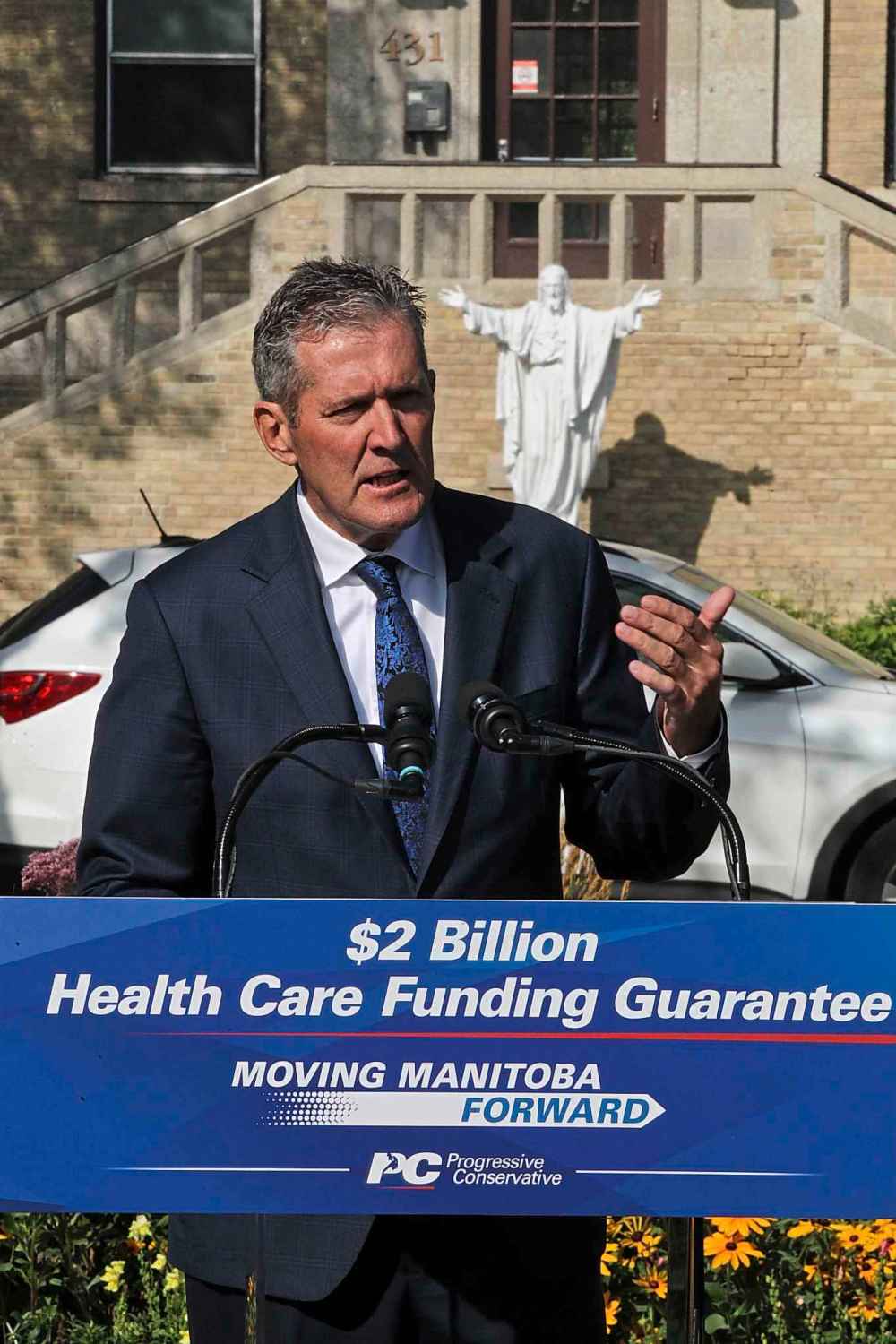Judicious spending key to health-care funding pledge
Read this article for free:
or
Already have an account? Log in here »
To continue reading, please subscribe:
Monthly Digital Subscription
$19 $0 for the first 4 weeks*
- Enjoy unlimited reading on winnipegfreepress.com
- Read the E-Edition, our digital replica newspaper
- Access News Break, our award-winning app
- Play interactive puzzles
*No charge for 4 weeks then billed as $19 every four weeks (new subscribers and qualified returning subscribers only). Cancel anytime.
Read unlimited articles for free today:
or
Already have an account? Log in here »
Hey there, time traveller!
This article was published 13/08/2019 (1717 days ago), so information in it may no longer be current.
The Progressive Conservative Party of Manitoba’s newest health-care pledge may seem like a lot of money. However, when you break it down between capital and operating expenditures, it’s not that much more than the Tories have spent over the past three years.
PC Leader Brian Pallister announced Wednesday a re-elected Tory government would spend at least $2 billion more on health care over the next four years; an average of $500 million annually. Some will be operating expenses, such as grants to hospitals and doctor billings; some will go towards capital spending, such as new personal care home beds, hospital upgrades, and diagnostic testing equipment.
Manitoba’s health-care budget for 2019-20 is $6.65 billion.

Pallister said the planned increase would represent an annual budget hike of more than two per cent, which would be close to $150 million a year. That’s not a whole lot more than the average annual increase of $104 million the Tories have been spending over the past four years. But it’s an improvement.
The remaining, about $350 million, would presumably go toward capital projects.
Pallister said details of the $2-billion allocation will be released when the party unveils its fully-costed platform later in the campaign. The 2019 Manitoba election is set for Sept. 10.
Either way, increased heath-care spending is modest and reasonable, especially given the government’s current financial status.
The Tories have made significant progress in reducing the provincial deficit to a projected shortfall of $360 million in 2019-20 from $932 million in 2016, but they’re not out of the woods yet. They’re still borrowing money to pay for day-to-day operations.
Considering that, and the fact the province is financing record levels of debt, $500 million a year in additional heath-care dollars over four years is a decent sum. It gives health authorities, hospitals and other health-care providers some indication of what resources are available over the next term in government.
The Tories have made significant progress in reducing the provincial deficit to a projected shortfall of $360 million in 2019-20 from $932 million in 2016, but they’re not out of the woods yet. They’re still borrowing money to pay for day-to-day operations.
It’s a lot more than the province is getting in health-care transfers from the federal government. Manitoba has received an average annual increase of $55 million through the Canada Health Transfer over the past three years.
It can expect similar increases in the coming years, barring any major changes by the federal government. (Which means the Tories’ pledge to boost annual health-care spending by $500 million is more than nine times the expected increases from Ottawa.)
That doesn’t include equalization payments from the federal government, which have increased by more than $200 million a year since 2017. Since that money can be allocated as the province sees fit, some portion of that would be expected to fund health care.
Manitoba’s NDP says voters can’t trust the Tories to make good on the $2-billion pledge, since they underspent some of their health budgets in recent years.
Fair comment. However, it should also be remembered the level of austerity required to slash the deficit by nearly two-thirds over the past three years was much higher than it will be over the next four years. In all likelihood, the books will be balanced in 2022 (possibly sooner), which will give government more flexibility to spend in areas such as health care.
What is just as important — maybe more important — than how much government spends on health care, is how those new resources will be used. We know from experience that dumping large sums of taxpayer dollars into a low-efficiency, poorly coordinated health care model doesn’t improve outcomes. We have over a decade of data on that.
The only way to improve health care is to make fundamental changes to how it’s delivered. Manitoba’s system is undergoing transformation now, including a hospital consolidation plan in Winnipeg. There have been some successes and some failures in those changes so far.
How well government, regional health authorities and health-care facilities buy into, adapt and succeed within that transformation will determine the quality of patient care over the next few years.
We need to focus less on how much government spends on services such as health care and more on what value taxpayers are getting for their money.
An extra $2 billion over the next four years should be enough to properly fund health care in Manitoba.
The key will be how wisely it gets spent.
tom.brodbeck@freepress.mb.ca

Tom Brodbeck
Columnist
Tom has been covering Manitoba politics since the early 1990s and joined the Winnipeg Free Press news team in 2019.


















